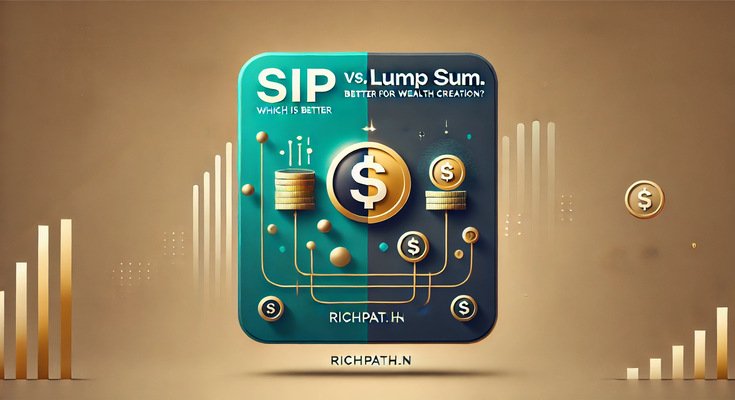
SIP vs. Lump Sum: Which Is Better for Wealth Creation?
Investing plays a crucial role in financial planning, and two popular methods—Systematic Investment Plans (SIPs) and lump sum investments—offer distinct advantages. But which one is better for wealth creation? The answer depends on factors like financial goals, risk tolerance, and available funds. This article explores the differences between SIP and lump sum investments, helping you determine which approach aligns best with your wealth-building strategy.
Understanding SIP and Lump Sum Investments
What Is SIP (Systematic Investment Plan and Which is Better for Wealth Creation)?
SIP is a method of investing in mutual funds where a fixed amount is contributed regularly (monthly, quarterly, etc.). It helps investors build wealth gradually while reducing market risk through rupee cost averaging.
Key Features of SIP:
- Encourages disciplined investing with periodic contributions.
- Suitable for individuals with consistent income.
- Helps investors avoid market timing risks.
Example:
Rahul invests ₹5,000 monthly through SIP in an equity mutual fund. Over a year, he invests ₹60,000, spreading his investment across different market conditions. This minimizes risk and allows steady wealth creation over time.
What Is Lump Sum Investment?
A lump sum investment involves investing a large amount at once. It is ideal for those with surplus funds and a clear understanding of market movements.
Key Features of Lump Sum:
- A one-time investment with potential for higher returns.
- Best suited for investors with higher risk tolerance.
- Market timing plays a crucial role in returns.
Example:
Ramesh receives a ₹5 lakh bonus and invests the entire amount in a mutual fund during a market dip. His wealth creation potential increases if the market performs well.
SIP vs. Lump Sum: Key Differences[Which is Better for Wealth Creation]
| Aspect | SIP | Lump Sum |
|---|---|---|
| Investment Frequency | Periodic (monthly, quarterly) | One-time investment |
| Risk Exposure | Lower due to averaging | Higher due to market timing |
| Discipline | Encourages regular saving | Requires strategic planning |
| Market Timing | No need to time the market | Market timing is crucial |
| Suitability | Best for salaried individuals | Ideal for those with lump sum funds |
Why SIP Is Better for Wealth Creation
1. Rupee Cost Averaging
SIP minimizes the impact of market fluctuations by purchasing more units when prices are low and fewer when prices are high. This helps lower the average cost per unit over time, making it better for wealth creation in volatile markets.
Example:
If the NAV of a mutual fund fluctuates between ₹50 and ₹70, SIP ensures Rahul buys units at an average NAV lower than ₹70, maximizing his long-term gains.
2. Disciplined Investment Approach
SIP instills a habit of regular investing, ensuring continuous contributions toward financial goals.
3. Power of Compounding[because its Better for Wealth Creation]
Over time, SIP investors benefit from compounding, where returns generate additional earnings.
Example:
An investment of ₹10,000 monthly for 20 years at a 12% annual return can grow to ₹1 crore—where ₹24 lakh is the invested amount, and ₹76 lakh is the compounded return.
4. Flexibility and Accessibility
SIP allows investors to start with as little as ₹500 per month, making it accessible to everyone.
Why Lump Sum Can Be Better for Wealth Creation[Which is Better for Wealth Creation]
1. Higher Returns with Market Timing
A well-timed lump sum investment during a market dip can generate significant returns, making it better for wealth creation in certain scenarios.
Example:
If Ramesh invests ₹5 lakh during a market downturn, his returns can be substantially higher than SIP investments over the same period.
2. Immediate Capital Deployment
Large initial investments benefit more from long-term market growth, allowing investors to capitalize on extended bull runs.
3. Convenience
Lump sum investing eliminates the hassle of monthly contributions, making it suitable for those who prefer a hands-off approach.
Challenges of SIP and Lump Sum Investments
Challenges of SIP:
- May underperform during prolonged bull markets.
- Requires regular cash flow, which might not always be feasible.
Challenges of Lump Sum:
- Higher risk due to market timing.
- Investing during a market peak can result in significant losses.
Which Is Better for Wealth Creation?
The choice between SIP and lump sum depends on individual circumstances:
Choose SIP If:
✅ You have a regular income (e.g., salaried professionals).
✅ You want a low-risk approach to long-term wealth building.
✅ Your goal is financial discipline and steady growth.
Choose Lump Sum If:
✅ You have surplus funds (e.g., inheritance, bonuses).
✅ You are comfortable with higher risk and market timing.
✅ You seek faster capital appreciation.
Combining SIP and Lump Sum for Maximum Wealth Creation
A hybrid strategy often works best—investing a lump sum during market dips while continuing SIPs ensures steady growth and risk mitigation.
Example:
Meena receives ₹3 lakh from a fixed deposit maturity. She invests ₹1 lakh as a lump sum and uses the remaining ₹2 lakh for SIP contributions of ₹5,000 per month.
Practical Wealth Creation Strategies for Indian Investors
✅ SIP for Middle-Class Families – Monthly SIPs of ₹5,000 can build a long-term financial cushion.
✅ Lump Sum for Bonuses – IT professionals investing annual bonuses can accelerate wealth creation.
✅ SIP for Retirement Planning – Regular SIPs in equity mutual funds help accumulate a significant retirement corpus.
Tax Implications of SIP and Lump Sum
Equity Mutual Funds
- Short-Term Capital Gains (STCG): 15% tax if sold within 1 year.
- Long-Term Capital Gains (LTCG): Tax-free up to ₹1 lakh, then taxed at 10%.
Debt Mutual Funds
- STCG: Taxed as per your income tax slab (if sold within 3 years).
- LTCG: Taxed at 20% with indexation benefits after 3 years.
Note: SIP and lump sum investments have the same tax rules, but the timing of redemption determines the tax liability.
Conclusion: Which Investment Strategy Is Better for Wealth Creation?
Both SIP and lump sum investments have unique advantages, and the best choice depends on your financial situation and risk appetite.
🔹 SIP is the better option for long-term wealth creation, especially for beginners and those with regular income.
🔹 Lump sum works better for experienced investors who can time the market effectively.
For most investors, a combination of both strategies maximizes returns while minimizing risk. Staying invested with a clear financial plan is key to achieving financial freedom.
For expert financial insights, visit Rich Path. and start your investment journey today! 🚀
Read more –
Top 5 Mutual Funds for Long-Term Growth in India in 2025
Best Mutual Funds: How to Choose – A Complete Guide
Best Flexi Cap Mutual Funds to Invest in 2025
Disclaimer: This article is for informational purposes only and does not constitute financial advice. Please consult a financial advisor before making investment decisions.



